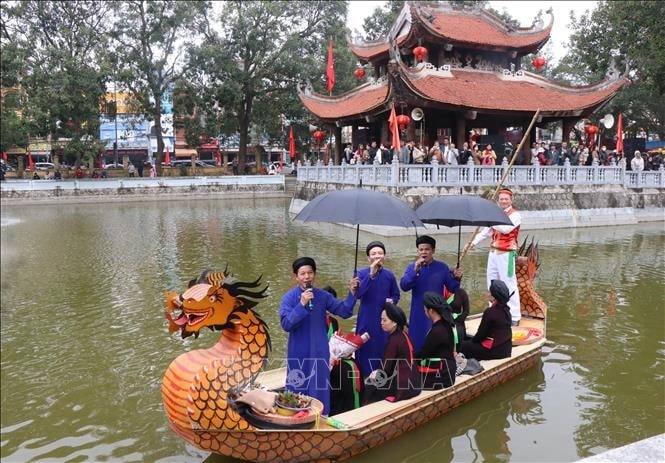The Ministry of Culture, Sports and Tourism requested the People's Committees of provinces and centrally-run cities to direct administrative units formed after the reorganization for a number of areas under the state management of culture, sports and tourism.

The Ministry of Culture, Sports and Tourism has just sent a document to the People's Committees of provinces and centrally-run cities to guide the review, adjustment and determination of administrative units with relics recognized and ranked as world cultural and natural heritages, special national relics of administrative units to be rearranged and reorganized... and other related issues under the state management of the ministry.
Perfecting the relic management system
In the field of cultural heritage, the administrative unit after arrangement has cultural heritage recognized, ranked, registered as world cultural and natural heritage, special national relic, national relic, provincial and city-level relic (hereinafter referred to as relic); intangible cultural heritage recognized by UNESCO, intangible cultural heritage in the list of national intangible cultural heritage; national treasures, implement the following contents:
Regarding relics, the names of world cultural and natural heritages, special national relics, national relics, provincial and city-level relics that have been recognized and ranked shall be kept intact so as not to change the original elements constituting the relics as well as the historical, cultural and scientific values of the relics according to the provisions of the Law on Cultural Heritage and the 1972 UNESCO Convention on the Protection of World Cultural and Natural Heritage. At the same time, the place names associated with the relics shall be updated according to the newly arranged administrative units.
At the same time, review and adjust the new names, locations, and addresses of organizations, Boards/Centers for managing relics directly related to the administrative units formed after the rearrangement; comply with the provisions of the law on cultural heritage and international treaties in the UNESCO Conventions that Vietnam has signed related to world cultural and natural heritage, special national historical relics; ensure that there are organizations and representatives directly responsible for managing, protecting, and looking after the relics. Do not let the situation of not having or not knowing the person directly responsible.
Complete the relic management apparatus to ensure the good performance of relic protection tasks. Issue regulations on management, protection and promotion of historical - cultural relics and scenic spots under the authority of commune-level administrative units after the rearrangement.
Review the scientific records of relics stored at the People's Committee at the commune level to have a basis for managing relics according to authority. Pay special attention to the Minutes and Maps of the protected areas of relics certified by the People's Committee at the commune level before arranging for unified land management. In case they are no longer stored, request a copy from the higher management agency.
Regarding intangible cultural heritage, keep the name of the heritage so as not to change the historical, cultural and scientific value of the heritage; review the scientific records of the heritage to unify the scope of distribution and spread of the heritage to have a basis for management according to authority. Comply with the provisions of Vietnamese law on intangible cultural heritage and the 2003 UNESCO Convention for the Safeguarding of Intangible Cultural Heritage.
Regarding national treasures, review, identify and adjust the administrative unit where the national treasure is kept compared to the name of the administrative unit in the Prime Minister's Decision on recognition of national treasures.
Review of traditional festivals
Regarding the field of grassroots culture, the Ministry of Culture, Sports and Tourism proposes to add the subjects of review to be traditional festivals being held at relics recognized and ranked as world cultural and natural heritages, special national historical heritages being reviewed, except for traditional festivals that have been recognized by UNESCO or are on the list of national intangible cultural heritages. These traditional festivals are determined according to 2 levels: "provincial traditional festivals" or "commune traditional festivals" according to the provisions of Decree No. 110/2018/ND-CP dated August 29, 2018 of the Government regulating the management and organization of festivals.
Traditional festivals identified as provincial-level traditional festivals continue to carry out registration procedures and festival organization notification according to regulations in Clause 2, Article 9, Article 12 and Clause 2, Article 14, Article 15 of Decree No. 110/2018/ND-CP.
Traditional festivals identified as commune-level traditional festivals continue to carry out the procedures for notifying the organization of festivals according to the provisions of Articles 14, 15 and 17 of Decree No. 110/2018/ND-CP.
Other contents related to festival organization and management will be consulted by the Ministry of Culture, Sports and Tourism, proposing the Government to amend Decree No. 110/2018/ND-CP dated August 29, 2018 regulating festival management and organization after the Law on Organization of Local Government (amended) takes effect.
Update the place names associated with the tourist area according to the new administrative unit
The Ministry of Culture, Sports and Tourism requires the names of recognized national tourist areas to be kept unchanged. At the same time, update the place names associated with the tourist areas according to the newly arranged administrative units; review and adjust the new names, place names, and addresses of the organizations/management boards of tourist areas directly related to the administrative units formed after the arrangement.
Regarding the order, procedures, and authority to recognize provincial-level tourist areas at Point a), Clause 2, Article 27 of the Law on Tourism, it is proposed to amend the Law on Tourism in the direction that: Provincial-level tourism professional agencies prepare dossiers to request recognition of provincial-level tourist areas.
The People's Committees of provinces and centrally run cities shall direct administrative units formed after the arrangement to send review and implementation reports to the Ministry of Culture, Sports and Tourism before October 30, 2025.